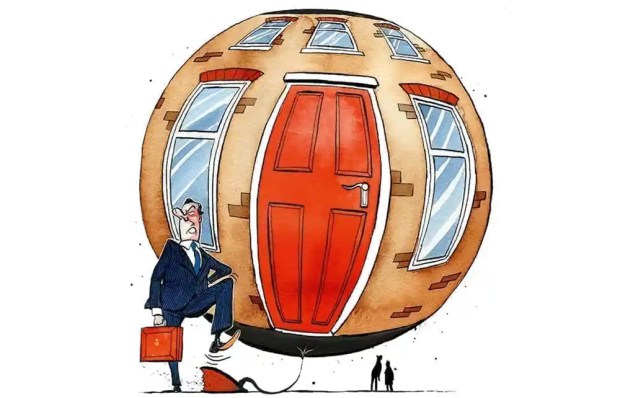Everyone —including me, if I’m honest — has been talking about a new property bubble. But is it for real? London house prices are rising at an annual rate of almost 10 per cent, and shares in the capital’s bellwether back-from-the-dead estate agency Foxtons soared on their stock market debut last week. Yet according to the Office for National Statistics, the national rise is just 3.3 per cent, the average price of a home having only recently regained its pre–credit-crunch peak. -Outside the South-East, and hotspots such as oil-rich Aberdeen, the pattern is largely flat or even falling. Although real incomes (adjusted for inflation) have fallen over the past five years, nominal incomes have risen by 10 per cent or so, which means the average house is, at least notionally, a little more affordable than it was in 2008.
And although the government’s Help to Buy and Funding for Lending schemes have breathed life into the mortgage market (in the latter case by scooping cash the Bank of England would clearly have preferred to see lent to small businesses), many would-be first-time buyers still struggle to raise finance. Meanwhile, the FT reports that cash-only transactions led by Asian buyers account for 35 per cent of the current property market, with the proportion of cash equity (including mortgage deposits) in all transactions standing as high as 62 per cent — squashing the idea that buyers are loading up with dangerous debt.
So it seems we’ve been making a ‘bubble’ out of what is really the well established phenomenon of central London as a safe haven for foreign wealth — and a place where (according to the European Banking Authority) almost 2,500 bankers earn more than €1 million a year each, compared with 600 in the rest of the EU put together, and are ever-ready to bid up values in desirable postcodes.
The downside of this is the creation of rich (and partially unoccupied) ghettoes, while those who work nearby have to travel further and further from places where they can afford to live — and if anything this social divide will intensify as a recovering UK looks even more attractive to safe–haven fat cats, but wage rises remain relatively subdued.
After my recent suggestion of a levy on megabuck property sales to fund affordable housing, a reader at our tea party accused me of being a ‘closet democrat’ (I think he meant pinko). But I assured him I’m just a lateral-thinking pragmatist — and I hope others in that mode will devise painless ways of channelling real-estate loot into improvements in the capital’s transport system, to make long commutes more bearable and ‘satellite cities’ more viable. The particular lateral thinker I have in mind is the former transport minister Lord Adonis, apparently a potential Labour candidate for London mayor. I look forward to hearing from him.
Autumn is almost here
One consequence of the long summer we’re still enjoying is that the energy debate has gone strangely quiescent. Have you heard any news about a start date for the new Hinkley Point nuclear power station since it was granted planning permission in March? Neither have I, because ministers are still at loggerheads with the French contractor EDF over the ‘strike price’ of electricity from the plant when it is eventually built.
And this week came the cancellation by Centrica — for lack of government subsidy — of plans for gas-storage facilities under the North Sea that would have almost doubled UK capacity from its current minimal level of less than three weeks’ supply. The usually sensible business minister Michael Fallon says there’s plenty of imported gas to be had these days and he doesn’t want to burden consumers with the cost of the subsidy. Well, maybe; but it’s just six months since a cold spell when we were so close to running out that the BBC started tracking individual LNG tankers from Qatar as they headed for British ports. The sun may be shining now, but an accumulation of decisions not to invest in gas and nuclear capacity and grid connections is hastening the day when we shiver in the dark. As the first chill of autumn arrives, let us refocus on the failure of politicians and industry leaders to shape and drive anything resembling a national energy strategy.
A matter of timing
I found myself talking to a young blade who said he was a hedge-fund manager. ‘What are you making money on these days?’ I asked. ‘Lloyds,’ he replied, without hesitation, ‘this year’s best-performing share.’ ‘Good for you,’ I shot back with the touch of acid that I fear is my wont in such encounters. ‘And did you also short it on the way down?’ He twitched and turned to talk to someone friendlier. He didn’t look much like John Paulson, the New York high-roller who made hundreds of millions betting on the collapse of UK banks, but it was still a pertinent question. Having fallen off a cliff in the crisis that followed its 2009 takeover of HBOS, Lloyds Banking Group was the second-worst-performing FTSE 100 share of 2011, down 61 per cent — driven by waves of short-selling in anticipation of further falls. It was then the best performer of 2012, up 85 per cent; and if you bought it last September, you would have doubled your money.
Following last week’s placing with institutions of £3.3 billion-worth of the government’s holding, at 75 pence per share, the price has paused but is expected to motor on upwards, partly for the technical reason that there is now less of an ‘overhang’ of state-held stock to be sold. The deal yielded a £61 million ‘profit’ for the Treasury, which had paid an average of 73.6 pence for its holding, but that didn’t count the borrowing cost of the stake money. So the taxpayer is still down, while the part-nationalisation of Lloyds has been a golden gift to speculators — so long as they picked the right times to buy then sell, or sell then buy. As it says in the Lloyds advertising campaign that’s currently all over our newspapers, ‘These are the moments that matter.’
Got something to add? Join the discussion and comment below.
Get 10 issues for just $10
Subscribe to The Spectator Australia today for the next 10 magazine issues, plus full online access, for just $10.
You might disagree with half of it, but you’ll enjoy reading all of it. Try your first month for free, then just $2 a week for the remainder of your first year.














Comments
Don't miss out
Join the conversation with other Spectator Australia readers. Subscribe to leave a comment.
SUBSCRIBEAlready a subscriber? Log in